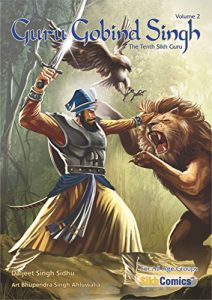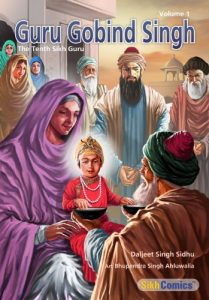I 99eBooks è una directory di eBook. Cerchiamo e classificato intorno alle eBooks Web per te!
Tutti i diritti riservati. I libri e libri elettronici sono di proprietà dei rispettivi proprietari.
Guru Gobind Singh, Volume 2: The Tenth Sikh Guru (Sikh Comics) (English Edition)
Guru Gobind Singh, the tenth Guru of the Sikhs, is an exemplary role model who sacrificed everything he had so that ordinary men and women had the freedom to choose and follow the faith of their choice. He laid the foundation of a struggle initiated to free India from hundreds of years of subjugation by ruthless invaders and foreigners.
He was only nine when he counseled his father, Guru Tegh Bahadur, to fight against religious oppression. Guru Tegh Bahadur was martyred at the hands of the Mughals when he insisted that they stop the persecution of the Hindus. Guru Gobind Singh's mother and his four sons also sacrificed their lives for the Sikh faith while fighting against the Mughals and the Hill Chiefs. Against all odds, Guru Gobind Singh fought several battles instigated by the Mughals and the Hill chiefs. In the end, Guru Gobind Singh was martyred when the Mughal Emperor sent assassins to the Guru’s camp in Nanded.
Guru Gobind Singh formed a nation of death-defying saint-soldiers, whom he named Khalsa. These soldiers were ordinary people who had been enslaved for over a thousand years. He gave Khalsa, the spirit of Chardikala, which meant unwavering courage, spirituality and optimism in the face of all impossible odds. He further delegated the authority of the Guru to the five faithful ones, when he declared that wherever the Khalsa is, the Guru is present there as well.
Guru Gobind Singh was a great patron of music, education and poetry. He was a wonderful poet himself. He wrote poems deeply imbued with noble qualities such as inspiration, devotion, defiance, heroism, and faith in One God, the Almighty. His works include an autobiography and several Hindu mythological stories, rewritten by him to depict the fighting spirit of its heroes. He also wrote an epistle of victory and sent it to Emperor Aurangzeb, the tyrant king who thirsted for the Guru’s blood.
Guru Gobind Singh believed and preached what the previous Sikh Gurus had believed and preached themselves. He continued the moral, spiritual and social reforming that was initiated by Guru Nanak. In keeping with the previous Gurus, he asked his followers to fight against evil and tyranny, and to always choose the path of right action and support the righteous. However, he told his followers that when all other means failed, it was more than necessary to pick up a sword and fight to maintain justice.
Before Guru Gobind Singh departed from the mortal world, he installed the holy Guru Granth Sahib as the permanent Guru of the Sikhs, thus ending the lineage of human Gurus.
I was in deep meditation. God sent me to this world with the following words: "I glorify you as my son. I created you for propagating the Panth (the Sikh path). Go and preach dharma (divine order), and prevent people from committing evil." -- Guru Gobind Singh in Bachitar Naatak.
He was only nine when he counseled his father, Guru Tegh Bahadur, to fight against religious oppression. Guru Tegh Bahadur was martyred at the hands of the Mughals when he insisted that they stop the persecution of the Hindus. Guru Gobind Singh's mother and his four sons also sacrificed their lives for the Sikh faith while fighting against the Mughals and the Hill Chiefs. Against all odds, Guru Gobind Singh fought several battles instigated by the Mughals and the Hill chiefs. In the end, Guru Gobind Singh was martyred when the Mughal Emperor sent assassins to the Guru’s camp in Nanded.
Guru Gobind Singh formed a nation of death-defying saint-soldiers, whom he named Khalsa. These soldiers were ordinary people who had been enslaved for over a thousand years. He gave Khalsa, the spirit of Chardikala, which meant unwavering courage, spirituality and optimism in the face of all impossible odds. He further delegated the authority of the Guru to the five faithful ones, when he declared that wherever the Khalsa is, the Guru is present there as well.
Guru Gobind Singh was a great patron of music, education and poetry. He was a wonderful poet himself. He wrote poems deeply imbued with noble qualities such as inspiration, devotion, defiance, heroism, and faith in One God, the Almighty. His works include an autobiography and several Hindu mythological stories, rewritten by him to depict the fighting spirit of its heroes. He also wrote an epistle of victory and sent it to Emperor Aurangzeb, the tyrant king who thirsted for the Guru’s blood.
Guru Gobind Singh believed and preached what the previous Sikh Gurus had believed and preached themselves. He continued the moral, spiritual and social reforming that was initiated by Guru Nanak. In keeping with the previous Gurus, he asked his followers to fight against evil and tyranny, and to always choose the path of right action and support the righteous. However, he told his followers that when all other means failed, it was more than necessary to pick up a sword and fight to maintain justice.
Before Guru Gobind Singh departed from the mortal world, he installed the holy Guru Granth Sahib as the permanent Guru of the Sikhs, thus ending the lineage of human Gurus.
I was in deep meditation. God sent me to this world with the following words: "I glorify you as my son. I created you for propagating the Panth (the Sikh path). Go and preach dharma (divine order), and prevent people from committing evil." -- Guru Gobind Singh in Bachitar Naatak.


















